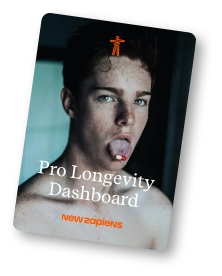Cycle Awareness: The Forgotten Key to Women’s Longevity

Longevity has become one of the most talked-about topics in wellness. Everywhere you look, people are optimizing sleep with trackers, experimenting with fasting, taking supplements, plunging into ice baths, and measuring recovery scores. The conversation is rich, and the goal is compelling.
Yet, as exciting as this movement is, one essential element remains largely absent: the female menstrual cycle.
I’m Natalie Rechberg, CEO of a Female Health Tech Company, and my passion is celebrating the menstrual cycle in all its beauty. Over the years, I’ve realized that understanding this natural rhythm is not just fascinating, it’s essential for long-term health.
For half of the population, the cycle is not a minor side note to health. It is a biological rhythm, a feedback system, and, when properly understood, a built-in longevity tool.
The Cycle as a Vital Sign
The menstrual cycle is often framed narrowly in terms of fertility, but it plays a much broader role. Increasingly, experts recognize it as a vital sign of health, comparable to heart rate, blood pressure, or respiratory rate.
Hormonal rhythms influence nearly every system in the body. Estrogen and progesterone affect bone density, cardiovascular resilience, skin elasticity, cognitive health, metabolism, and emotional stability.
Menstrual irregularities can be one of the earliest and most reliable indicators of long-term health and offer a path to early intervention. A cycle with consistent ovulation and manageable, not overly painful periods, signals balance across these interconnected systems.
When that balance shifts, reflected in changes of cycle length, basal temperature, or the severity of symptoms during menstruation or other phases, it may signal underlying issues such as metabolic stress, thyroid dysfunction, or cardiovascular risk. Early recognition of these signals allows for timely intervention, supporting better health and long-term well-being.
Why Ovulation Is at the Heart of Longevity
While menstruation is the most visible aspect of the cycle, it is not the main event. Ovulation is.
Ovulation triggers the production of estrogen and progesterone. These hormones are not only needed for the reproductive process, they are important for the whole body. Estrogen supports bone strength, cardiovascular health, cognitive function, and even skin vitality. Progesterone plays a key role in sleep regulation and calming the nervous system.
As long as ovulation occurs regularly, the body continues to receive these benefits. Once ovulation becomes irregular or stops altogether, hormone production declines, and risks for osteoporosis, cardiovascular disease, and cognitive decline increase.
Supporting ovulation for as many years as possible is therefore central to women’s longevity. It is not just about fertility, it is about sustaining the very hormones that stabilize health across decades.
The Rise of Hormone-Free Approaches
For decades, hormonal contraception has been prescribed as a solution to everything from irregular cycles to acne. While highly effective in certain areas, these methods suppress ovulation, cutting off the natural production of estrogen and progesterone. Over time, this can mean losing the hormonal benefits that protect long-term health.
An important shift is now underway. Hormone-free approaches such as cycle tracking, basal body temperature monitoring, and smart fertility devices are gaining momentum. These tools offer not only contraceptive alternatives but also valuable insights into overall health. They allow women to see whether ovulation is happening consistently, track changes in stress or metabolism, and spot imbalances early.
Living in tune with the Cycle
Beyond these health benefits, understanding and tracking the cycle also allows us to live in tune with our bodies.
Too often, the cycle is framed as a burden. In reality, it offers a unique advantage when seen as a guide. Each phase contains certain characteristics and strengths that can enhance daily life and long-term wellbeing:
- Follicular phase: Rising estrogen fuels creativity, learning, and physical performance.
- Ovulation: Confidence, communication skills, and social connection peak.
- Luteal phase: Heightened sensitivity and sharper critical thinking support problem-solving and reflection.
- Menstruation: A natural window for rest and recalibration.
This rhythm can serve as a blueprint for managing energy, preventing burnout, and living more in harmony with the body. I personally use my cycle phases as a guideline to plan both my personal and professional life whenever possible. For example, I schedule my most important meetings during the follicular phase, especially around ovulation.
It’s time for a New Perspective on Longevity
When longevity is discussed without considering the menstrual cycle, half the picture is missing. For women, the cycle is not simply biology. It is a rhythm that provides feedback, produces protective hormones, and enhances life through its natural phases, if we listen to them.
Ovulation, in particular, is central to this. By sustaining regular ovulation and supporting natural hormone production, women not only preserve fertility but also safeguard the very systems that underpin resilience in later life.
Seen this way, the cycle becomes one of the most powerful and underutilized longevity tools available. It is not an inconvenience but a superpower. One that enhances energy, guides self-awareness, and builds a foundation for vitality across a lifetime.
Longevity is not just about more years. It is about better years. For women, honoring the cycle creates a path toward health that is cyclical, sustainable, and profoundly life-enhancing.
Author: Natalie Rechberg
Natalie Rechberg is dedicated to enabling women through body literacy and menstrual cycle insights. As CEO of Valley Electronics AG and creator of Daysy and Teena, her mission is clear: to simplify and enhance women’s health through cycle tracking. With over 40 years of family expertise in fertility technology, she grew up in a field centered on women’s wellness. Inspired by her father, Natalie creates tools that help women make informed choices about their bodies and lives.




